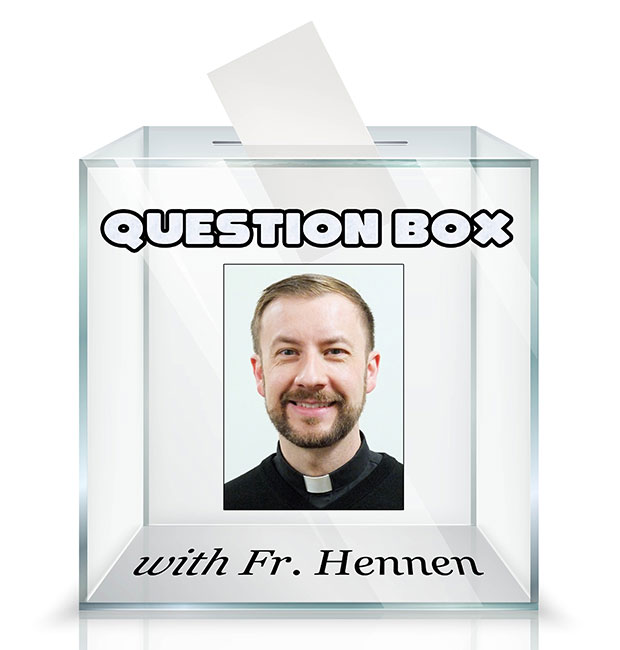 By Fr. Thom Hennen
By Fr. Thom Hennen
Question Box
Q: Do Catholics believe in ghosts?
A: Every old building seems to have at least a few ghost stories attached to it. I know that my old seminary did.
There was a story of a seminarian who was working on a paper late at night in the lower level of the seminary where the computer lab was located. He pressed the elevator button to go back up to his room. While he was waiting for the elevator to arrive, he noticed a figure in black pants and a white shirt at the far end of the corridor. Assuming it was just another seminarian going down to the computer lab, he wondered how he hadn’t noticed him before. When the elevator arrived, the seminarian stepped in and turned around, only to see this person now standing in front of the elevator door, as though instantly transported from the end of the long hallway. The figure said, “Pray for me,” and the elevator doors closed!
Great story, huh? But is it true? I don’t know. The story goes that the seminarian told his spiritual director about it and they arranged to have some Masses offered for the repose of this person’s soul and there was never another encounter after that.
So, do Catholics believe in ghosts? Not exactly. From a theological perspective, what people think of as “ghosts” can be only one of four things: (1) our imaginations gone wild; (2) angels; (3) demons; or (4) souls in purgatory trying to get our attention to pray for them.
Personally, I am a bit of a natural skeptic when it comes to these things. I am always going to try to find a natural explanation first. The human mind is a vast and weird place. We can easily think we heard, saw or felt something. We can even begin to convince ourselves of this by re-telling the story. We can be easily influenced by things we may have recently heard or seen.
When I was a college chaplain I would always get a lot more requests for room or house blessings in the weeks leading up to Halloween, as students were convinced something supernatural was going on. I was happy to explain what we believe and don’t believe, the importance of daily prayer, reading Scripture, going to Mass and regular confession, and the use of sacramentals (holy water, etc.). I would ask some general questions and often found that the students had been watching scary movies or shows or were not sleeping as much or as well as they should. Sometimes I would find out they were messing around with a Ouija board or other like things. Do you think any of that could have had an effect? Probably.
The Church explicitly forbids any kind of “divination” to tell the future or attempts to communicate with the dead (see “Catechism of the Catholic Church,” para. 2115-2117). At best, fortune telling, séances and the like are just silly; at worst they could be opening doors that ought not be opened. The Bible in several places also specifically condemns these practices (see Deuteronomy 18:10-11, Isaiah 19:3 and Jeremiah 29:8). Anytime we try to go around God to seek hidden (“occult”) knowledge we are in violation of the First Commandment.
We don’t need to look for a devil behind every bush, but we do believe in unseen realities and should exercise caution in what sort of things we expose ourselves to. I enjoy a good ghost story as much as anyone, but in the end I believe in the one God, who is God of the living and the dead, and in his Son, who has conquered death and promises resurrection for those who believe.
(Father Thom Hennen serves as the pastor of Sacred Heart Cathedral in Davenport and vicar general for the Diocese of Davenport. Send questions to messenger@davenportdiocese.org)








